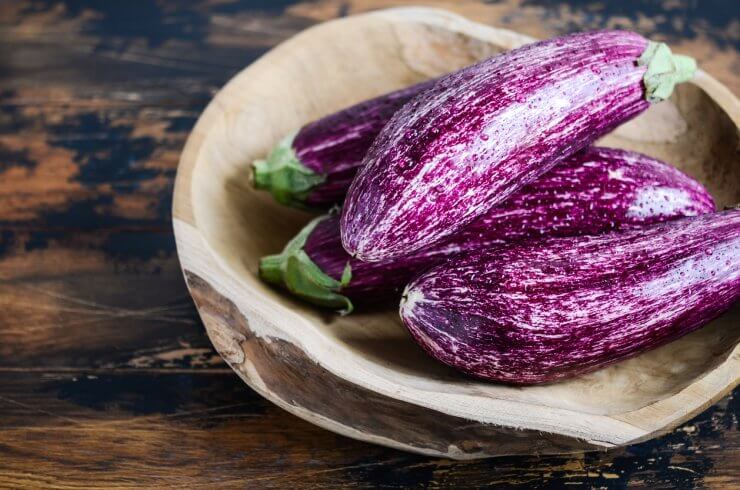
Fresh eggplants in a wooden bowl

Fresh eggplants in a wooden bowl
Eggplants aren’t particularly high in nutrients, but they do provide a platform for people to use when they are adjusting to healthier eating habits, like reducing refined carbohydrates and breads.
Here are some of the other ways eggplants contribute to good health.
Antioxidants
Eggplants are high in antioxidants, which can help clear the body of free radicals that contribute to cancer and other chronic diseases. Their beautiful color is a pigment called anthocyanins, which are antioxidants.
Heart Disease
Because of the high number of antioxidants, eggplant consumption could reduce risks of heart disease. In one study where rabbits with high cholesterol were given eggplant juice, after two weeks, their LDL cholesterol and triglycerides were lowered, both of which contribute to heart disease. In another study, animals showed improved heart function after eating eggplant every day for 30 days.
Blood Sugar
One of the biggest benefits of eating eggplant is its ability to lower blood sugar, because it is so high in fiber. Fiber slows down how fast your body processes food, which gives this result. Additionally, the polyphenols in eggplant may reduce sugar absorption and increase insulin secretion.
Cancer-Fighting
There are several elements that compose eggplants that may give them natural cancer-fighting abilities. Solasodine rhamnosyl glycosides (SRGs) for example, have been proven to kill cancer cells in animal studies, and may even prevent other types of cancers, particularly skin cancer, when applied directly.
Digestive Health
As mentioned previously, eggplant is packed with fiber. That fiber can feed friendly bacteria in your gut and aid in an overall healthy digestive system. Fiber has also been linked to a reduction in the risk of chronic diseases, including colon cancer, heart disease, and type 2 diabetes.
Brain Health
The phytonutrients in eggplant help improve blood flow to the brain, which improves mental health and memory by stimulating neural pathways.
Healthy Weight
Eggplants are low in calories, and high in water. They make a great substitute for pasta in Eggplant Parmesan, and can be used in any number of healthy recipes. If you aspire to the dietary guidelines of “eat the rainbow,” you can’t go wrong adding eggplant to the menu.
Eggplant Home Remedies
Eggplants are known for their skin benefits. As mentioned above, studies have shown they may even reduce skin cancer when applied directly. We’re not sure if the remedies below work, but they’re popular! Here are a few claims:
- You can get a wart to fall off by taping down a piece of fresh eggplant over it every night for two weeks.
- You can make a face mask by blending a slice of eggplant together with 2 tablespoons plain yogurt and leaving on for 20 minutes. Supposedly it will reduce age spots and improve your complexion.
- You can rub your scalp with a slice of eggplant to stimulate hair growth. You can also do this to your face to see freckles and spots fade over time.
Did you know that eggplants were so dynamic? Please tell us your biggest reason for growing and eating eggplant.




Eggplants.
I’m having problems with my eggplants. There are tiny little holes all in the leaves. Then suddenly there are now larger holes. I’ve noticed a lot of ants lately and the “rolly polly” are abundant. Maybe that’s my problem?
THANK You for any advice you can give me.
Barbara,
The tiny holes in the leaves of your eggplant may be caused by flea beetles. While a mature eggplant can typically withstand an attack from flea beetles, unfortunately, young eggplant leaves are quite susceptible to these pests.
Some preventative measures include cleaning up the garden area in the fall to limit places for beetles to overwinter, using row covers when eggplants are young and tilling or turning over the soil in the spring.
Once you have an infestation, you can try spraying your plants with an insecticidal soap, dust the area with diatomaceous earth or use a horticultural spray such as neem oil.
Here’s a DIY pest spray recipe that we often recommend:
“Mix 1 TBS of baking soda, 1/2 tsp of a mild dish detergent, and 2 1/2 TBS of olive oil in a gallon of water to make a solution that will repel all kinds of bugs, as well as a fungicide for blight and mildew on plant leaves. Shake it well in your bottle before spraying and repeat every week for it to be continuously effective.”
Good luck and let us know what method(s) you try and if they are successful.